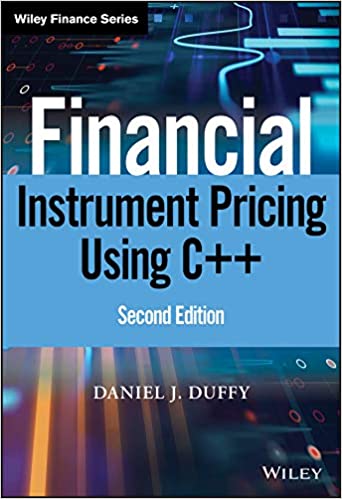By - Daniel Duffy
This complete guide to C++ and computational finance is a follow-up and major extension to Daniel J. Duffy’s 2004 edition of Financial Instrument Pricing Using C++. Both C++ and computational finance have evolved and changed dramatically in the last ten years and this book documents these improvements. Duffy focuses on these developments and the advantages for the quant developer by:
- Delving into a detailed account of the new C++11 standard and its applicability to computational finance.
- Using de-facto standard libraries, such as Boost and Eigen to improve developer productivity.
- Developing multiparadigm software using the object-oriented, generic, and functional programming styles.
- Designing flexible numerical algorithms: modern numerical methods and multiparadigm design patterns.
- Providing a detailed explanation of the Finite Difference Methods through six chapters, including new developments such as ADE, Method of Lines (MOL), and Uncertain Volatility Models.
- Developing applications, from financial model to algorithmic design and code, through a coherent approach.
- Generating interoperability with Excel add-ins, C#, and C++/CLI.
- Using random number generation in C++11 and Monte Carlo simulation.
Duffy adopted a spiral model approach while writing each chapter of Financial Instrument Pricing Using C++ 2e: analyse a little, design a little, and code a little. Each cycle ends with a working prototype in C++ and shows how a given algorithm or numerical method works. Additionally, each chapter contains non-trivial exercises and projects that discuss improvements and extensions to the material.
This book is for designers and application developers in computational finance, and assumes the reader has some fundamental experience of C++ and derivatives pricing.
Once you have purchased a copy of the book please send an email to the author dduffyATdatasim.nl requesting your personal and non-transferable copy of the source code. Proof of purchase is needed. The subject of the mail should be “C++ Book Source Code Request”. You will receive a reply with a zip file attachment.

Daniel J. Duffy started the company Datasim in 1987 to promote C++ as a new object-oriented language for developing applications in the roles of developer, architect and requirements analyst to help clients design and analyse software systems for Computer Aided Design (CAD), process control and hardware-software systems, logistics, holography (optical technology) and computational finance. He used a combination of top-down functional decomposition and bottom-up object-oriented programming techniques to create stable and extendible applications (for a discussion, see Duffy 2004 where we have grouped applications into domain categories). Previous to Datasim he worked on engineering applications in oil and gas and semiconductor industries using a range of numerical methods (for example, the finite element method (FEM)) on mainframe and mini-computers. Daniel Duffy has BA (Mod), MSc and PhD degrees in pure, applied and numerical mathematics from Trinity College, Dublin. He has been active in promoting partial differential equation (PDE) and finite difference methods (FDM) for applications in computational finance and was responsible for the introduction of the Fractional Step (Soviet Splitting) method and the Alternating Direction Explicit (ADE) method in computational finance. He is also the originator of the exponential fitting method for time-dependent partial differential equations. He is also the originator of two very popular C++ online courses (both C++03 and C++11/14) on www.quantnet.com in cooperation with Quantnet LLC and Baruch College (CUNY), NYC. He also trains developers and designers around the world.

